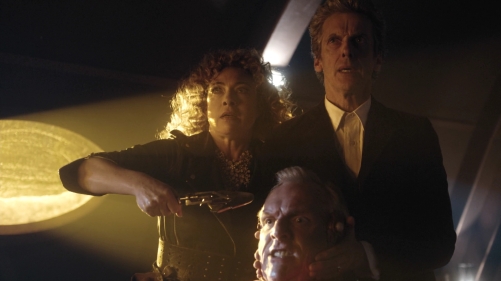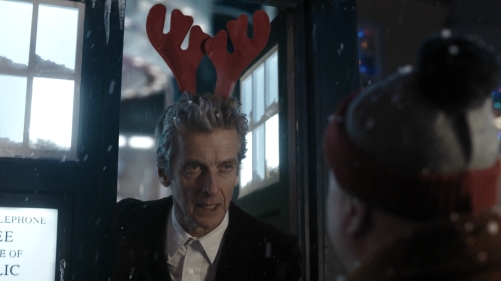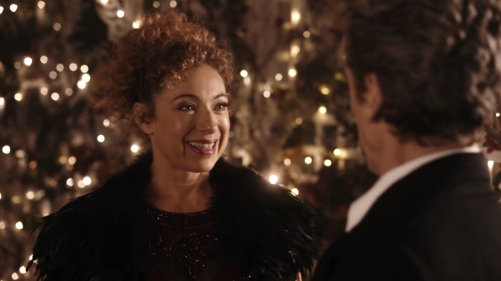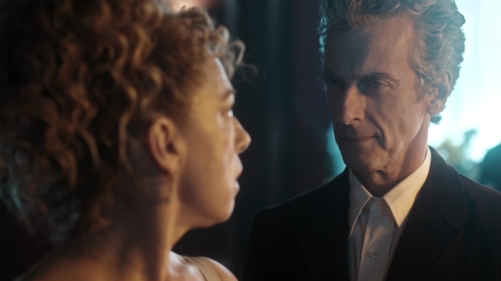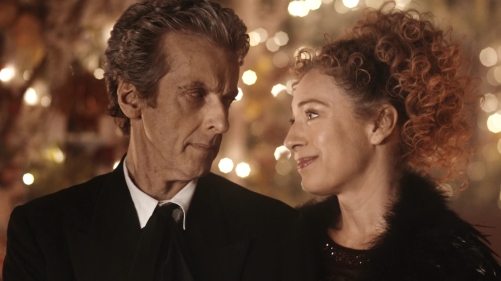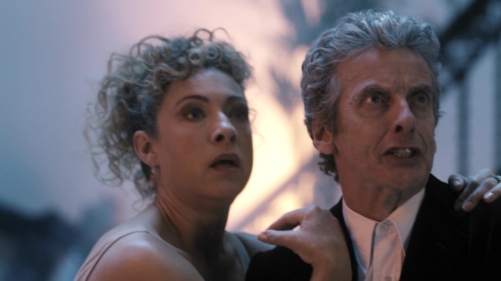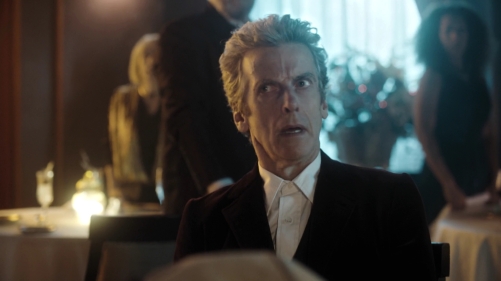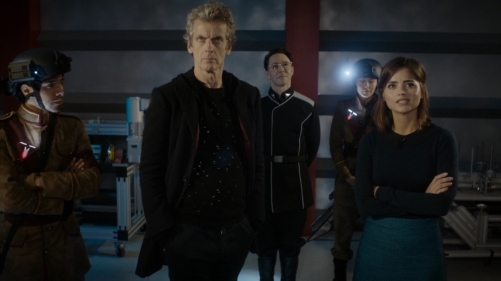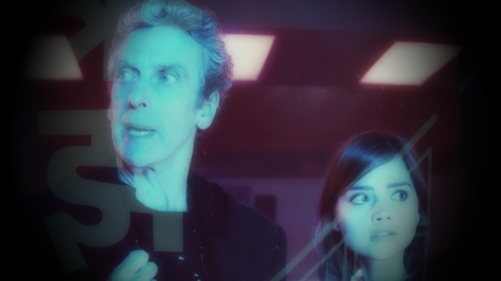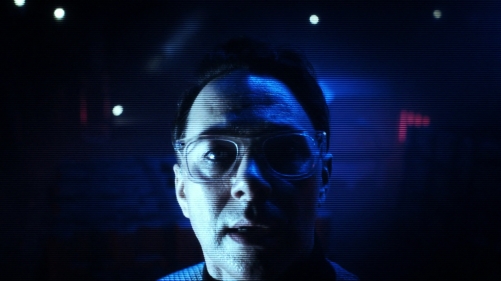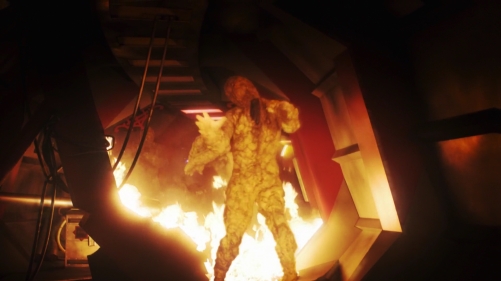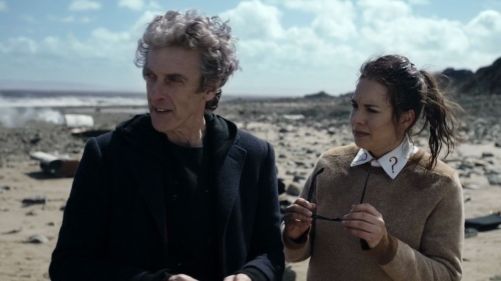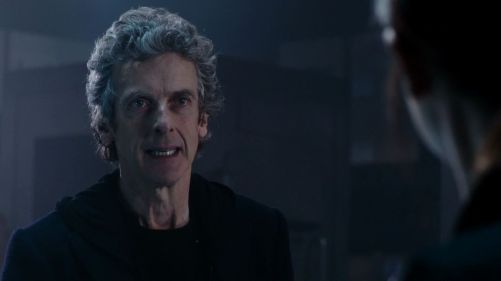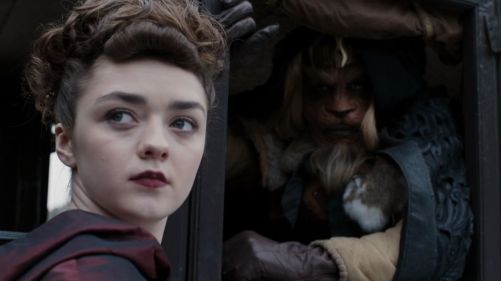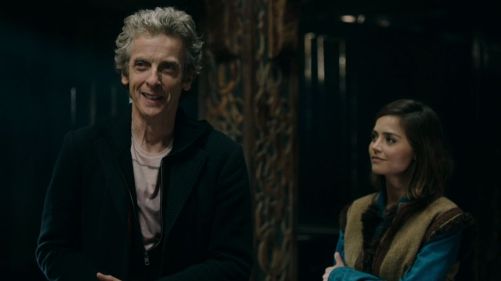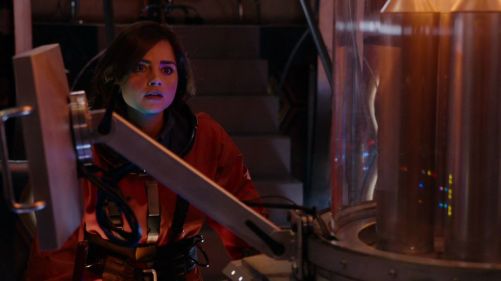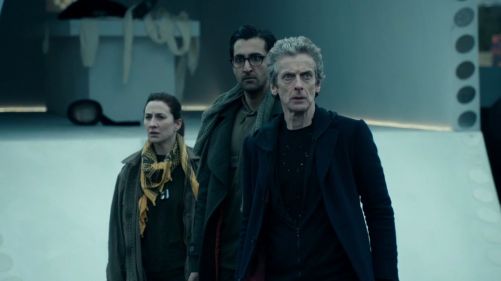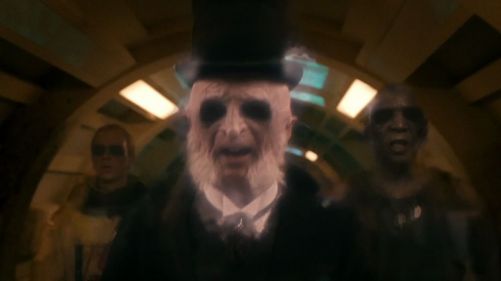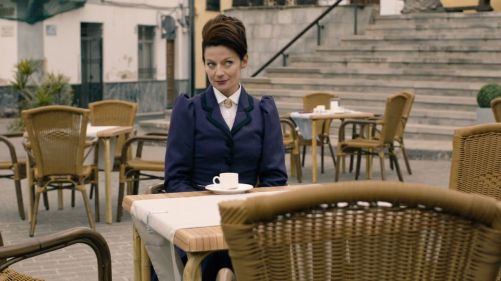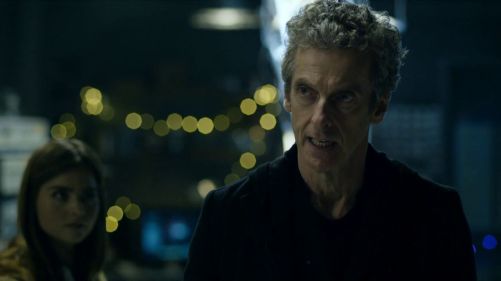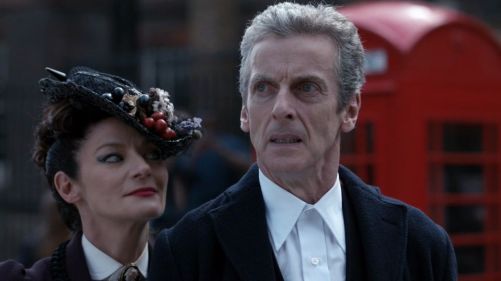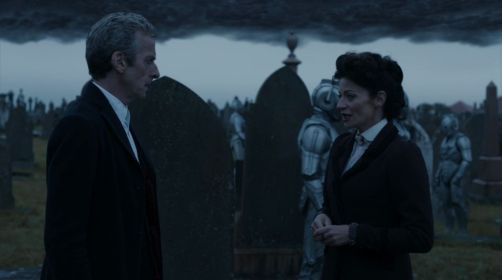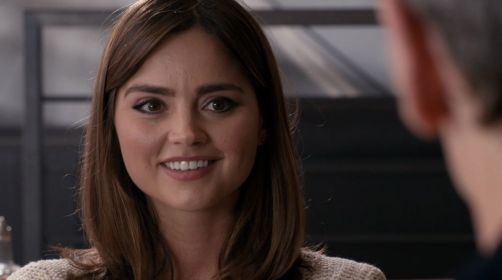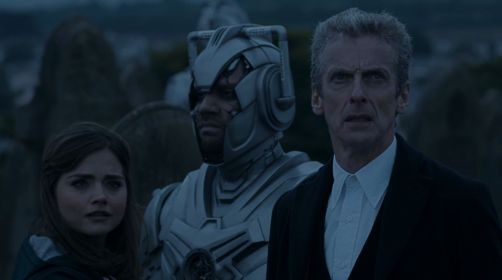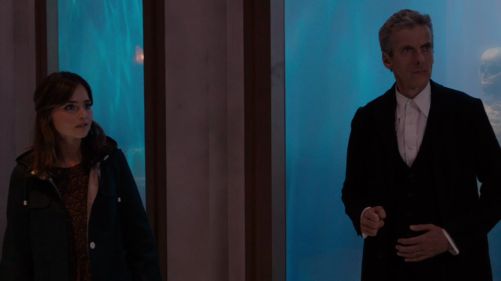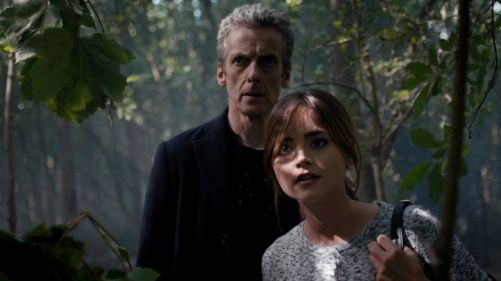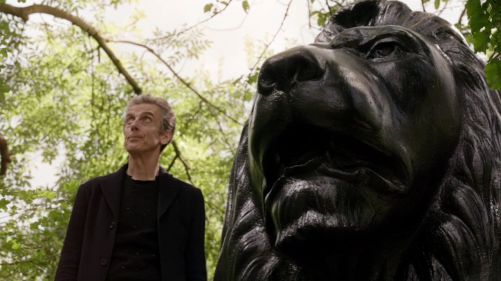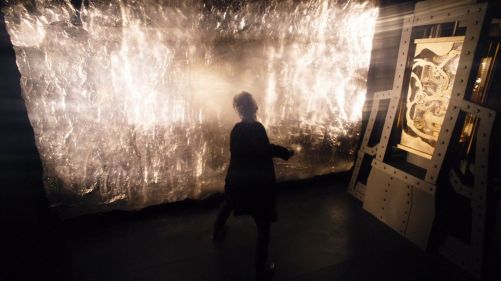
“Face The Raven / Heaven Sent / Hell Bent” is co-written by Sarah Dollard and Steven Moffat. It’s the grand finale of Doctor Who’s ninth season, and Clara Oswald’s swansong as a companion. The Impossible Girl has been a core part of the cast for two and a half seasons now – she’s traveled with two Doctors and played a major role in several storylines – so she sits alongside Rose Tyler and Amy Pond as one of the longest running companions in NuWho. Naturally, when it’s time for her to bow out, Steven Moffat decides to pull out all the stops with her departure story. “Hell Bent” also serves as another sequel episode to “The Day Of The Doctor“: if “The Zygon Invasion” gave us an update about the Zygon half of that episode, then “Hell Bent” finally tells us what became of Gallifrey after the Doctor saved it from the horrors of the time war.
The Series 9 finale is the culmination of everything Steven Moffat has been building up to since Series 7, when it comes to the Doctor’s relationship with Clara, his relationship with his home-world, and his struggles with maintaining his own code of ethics. Every Doctor has that one story that receives a lot of critical acclaim and becomes their most iconic episode (for David Tennant’s Doctor, it would probably be “Human Nature / The Family Of Blood“), and “Heaven Sent” is generally agreed to be Peter Capaldi’s finest hour as the Doctor, both from a writing and acting standpoint. While the first two episodes of this three-parter have received a universal amount of praise, the concluding chapter, “Hell Bent”, has always been more divisive. To this day, you’ll still see arguments in the fandom break out over whether or not it was a satisfying conclusion to “Heaven Sent”, or if it provided a good exit for Clara. In my experience, a major factor in how much you like it depends on how much you like Twelve and Clara, because for better or for worse, “Hell Bent” is all about them.
“Face The Raven” initially seems like your usual episode of Doctor Who – the Doctor and Clara do a favor for a friend, bump into another familiar face along the way, and race against the clock to solve a deadly mystery – until the last act, where everything goes horribly wrong for them. At which point, it slowly becomes apparent that you’re watching the opening act of a three-part finale, arguably the show’s first real three-part finale since “Utopia / The Sound Of Drums / Last Of The Time Lords” in Series 3. This trilogy of episodes certainly manages to deliver on all the exciting and heartbreaking moments that you’ve come to expect by now from a companion’s departure story – things get so messed up for our protagonists so quickly, and it makes for some fantastic drama – and it successfully manages to bring two and a half seasons’ worth of character development full circle for the Doctor and Clara Oswald.

“Face The Raven” begins with an ordinary day for the Twelfth Doctor (Peter Capaldi) and Clara. They answer a distress call from Clara’s friend, Rigsy, who’s concerned about a tattoo on the back on his neck that’s just appeared. The Doctor was initially skeptical of Rigsy back in “Flatline“, but he gained some more respect for him by the end of that episode, and since he’s mellowed out even further since then, his opinion of him has continued to improve as well. It would seem someone has given Rigsy a death sentence, and the tattoo on the back of his neck is a countdown of how much time he has left until he shakes off the mortal coil. The Doctor knows in his gut that he can’t stop the countdown, because that’s beyond even a time lord, but he’s still going to try – because Clara’s friend needs him, and Rigsy’s daughter needs her father. He can’t remove the Chronolock, but he can find whoever put a hit out on Rigsy in the first place and force them to remove it.
Their search leads them to a secret society where Rigsy was framed for murder and sentenced to death. When the Doctor finds out Ashildr was the one who set Rigsy up, purely so she could lure him to her own little neighborhood, he’s surprised and yet not surprised at all that she would stoop that low. Ever since he made her immortal, the Doctor has always felt uneasy around her and her deteriorating moral code. Now it seems his suspicions about her have been totally validated. After her trap has been sprung, she’s all set to send him away somewhere else, to become someone’s prisoner. In the Doctor’s eyes, it’s nothing he can’t handle – until the unthinkable happens. Clara got the bright idea of taking on Rigsy’s death sentence herself, so she could bluff Ashildr, but since she had no idea what she was doing, there’s no way to take it off her or stop it now. And even if there was, there simply isn’t time to think of a way to save her by the time the Doctor discovers what she’s done.
As Clara’s time rapidly runs out, the Doctor takes it incredibly hard. Everything he’s feared for her all season comes true before his eyes, and he’s completely powerless to stop it. And his reaction when he grows desperate is very disturbing. He threatens to rain hell down on both Ashildr and her community (who have done nothing to him) to try to force her to save Clara, when he knows perfectly well that she can’t. By Series 9, the Doctor and Clara’s codependent relationship has started to bring out the worst in them on both ends. Clara has grown way too cocky and suicidally reckless, while Twelve has grown obsessive and overly protective to the point of madness. The darkness that’s been building up inside of him all season comes boiling up to the surface when he decides to threaten Ashildr, and it’s only a glimpse of what’s to come for him in “Hell Bent”, where he goes off the deep end completely.
Clara manages to talk some sense into him one last time, by owning up to where her own choices have led her, and since she refuses to let him go on a revenge spree in her name, he has no choice but to let her demise play out. What follows is an absolutely beautiful scene between Peter Capaldi and Jenna Coleman, where both actors are firing on full cylinders: there’s so much that’s still left unsaid between the Doctor and Clara by the time she heads out to face the raven, but they manage to make the true depth of their feelings for each other perfectly clear through their actions. Clara dies in agony, right in front of the Doctor, and just before he’s teleported away into captivity, he shares a few deliciously icy final words with Ashildr. He forgave her for her betrayal in “The Woman Who Lived” pretty easily, because he sympathized with her and he knew her predicament was his fault in the first place. However, after her second betrayal winds up getting Clara killed, he does not waste any time letting her know she’s dead to him now – and I think most people would feel the same way.
Despite Clara taking full responsibility for the consequences of her actions, the Doctor still feels incredibly guilty about her death going into “Heaven Sent”. He brought her along with him to see the universe for two and a half seasons (first because he wanted to solve the mystery of her doppelgangers scattered throughout time, and then purely for fun and companionship), despite knowing how dangerous it would be for an ordinary human. He chose not to act on all the red flags of her worrying behavior since Danny’s death, and wound up enabling it by letting her get reckless. She died as collateral damage in a plot to capture him (a plan that was carried out by Ashildr, someone he brought back to life when he knew he shouldn’t have). The Doctor is furious with Ashildr and the time lords for betraying him, but in his eyes, Clara’s death is just as much his own fault as well.
On top of all of that, Clara has done so much for the Doctor since they first met. She’s been his closest friend and confidante for the last two seasons, and stuck with him through thick and thin, even when he wasn’t the easiest person to be around. She saved his life when she dove into his time-stream to stop the Great Intelligence from tampering with his past. She encouraged him to face up to his past, and correct one of his biggest failures on the last day of the time war. He could take solace in the fact that he kept her safe during the thousand year siege on Trenzalore, and she wound up saving his life once again at the end of that war, when she convinced the time lords to grant him a brand new regeneration cycle. The Twelfth Doctor and all of the other Doctors after him wouldn’t even exist if it wasn’t for Clara, so it makes perfect sense that Twelve would convince himself that he owed it to her to find a way to save her, even if Clara herself never asked him to do that – which sets the stage for “Heaven Sent” and “Hell Bent”.

“Heaven Sent” is one of the most experimental episodes of the Doctor Who revival. We’ve had several companion-lite episodes by now, where the Doctor’s co-star is noticeably absent, but “Heaven Sent” is the first single-hander story where the Doctor is the only character around in general (besides a silent, mute antagonist stalking him). “Heaven Sent” gives us a deeper look at how the Doctor thinks, which is always fascinating – especially now, when the Doctor is a lot more emotionally vulnerable than usual. Twelve is still grieving Clara – all that pain and anger and loss is all still raw and recent for him – so he’s still heartbroken. But he’s also still fighting, in spite of his physical and mental fatigue, because he refuses to give up and let his captors win.
Steven Moffat previously established that time lords think at a much faster rate than humans do – processing information with the speed of a computer inside of their minds. That’s why the Doctor has always been so good at improvising on the fly to get out of scrapes. So whenever he’s cornered by the Veil, with no chance of escaping, he always retreats into his mind for a few seconds to try to find a solution. He even imagines talking to Clara a few times, because his late friend inspires him. Peter Capaldi has always been a good fit for the role of the Doctor, but he has really come into his own this season. Series 9 has given him so many opportunities to shine – like his scenes with Davros in “The Witch’s Familiar“, his fourth wall breaking lecture explaining the bootstrap paradox in “Before The Flood“, his anti-war speech in “The Zygon Inversion” – and now he gets to carry “Heaven Sent” entirely by himself. There are points where his performance is truly phenomenal: like the emotional breakdown the Doctor has when he realizes how long he’s truly been trapped inside the castle, and the scene where the Doctor lays dying inside of his mind, as his strength slowly fails him.
“Heaven Sent” takes place inside a haunted and deserted castle, which is really a torture chamber for the Doctor, comprised of his fears. He’s hunted by a giant, lumbering corpse called the Veil, which is basically a Grim Reaper. He can slow it down for a while, by confessing information his captors want to know – specifically information about a creature called the Hybrid – but it will still follow him wherever he goes, and like death itself, it always manages to catch up to him in the end. Once he has a pretty good idea of what he’s dealing with, the Doctor manages to use the size of the castle and the Veil’s limitations to his advantage to do some exploring. There have clearly been other visitors in the castle before him: someone has painted a portrait of Clara in one of the bedrooms, there’s a fresh change of clothes waiting for him by the fireplace, there are hidden messages for him scattered throughout the building, and the sea outside the castle is filled with thousands upon thousands of skulls.
Eventually, the Doctor makes the horrific and gruesome discovery that all the previous visitors have been himself – countless other copies of himself who never managed to escape the castle alive. He’s been the living the same month over and over again for billions of years. While the Doctor is trapped inside his confession dial, the option to leave is always available, he simply refuses to take it. He prefers to break out by his own means – chipping away at a diamond wall, inch by inch, over countless millennia – than relinquish the information his jailers want. His knowledge about the Hybrid is the only bargaining chip he has, his only bit of leverage he can use to get into a position where he can save Clara – because if anyone would have the means to save Clara from her death, the time lords would.
The Doctor deliberately traps himself in a never-ending loop of maiming his hands, being killed by the Veil, and then respawned by the castle’s teleporter system. He basically makes himself a martyr for Clara, for four billion years, as his own twisted form of atonement for playing a part in her demise. “Heaven Sent” manages to play a trick on the viewers, before the following episode, “Hell Bent”, pulls the rug out from under them. “Heaven Sent” is told entirely from the Doctor’s point-of-view, and he obviously thinks his actions are justified, even if his resolve wavers at times under the sheer weight of his mission. After he realizes how long he’s been trapped in his self-inflicted hell, he starts to give into despair for a few moments. He wants to throw in the towel, which would be the sensible thing to do, the sane thing to do. Until he imagines Clara giving him a few words of encouragement to stick to his guns, at which point he gets back on his feet and resumes chiseling away at the wall with his bare fists.
The montage that follows, of the Doctor slowly wearing down the diamond wall more and more with each loop, is presented as a heroic and inspiring show of grit and determination against insurmountable odds. It even has a swelling, heartfelt soundtrack backing it, that builds to a stunning climax when he finally accomplishes his goal. However, when we finally see the Doctor from an outside perspective again in “Hell Bent”, and we see where his priorities now lie, it slowly becomes apparent that “Heaven Sent” wasn’t sixty minutes of the Doctor being a heroic badass – not this time. “Heaven Sent” was sixty minutes of the Doctor slowly losing his mind out of grief and obsession. Rather tellingly, when the real Clara finds out what the Doctor did for her, she’s completely horrified. She would never want her friend to put himself through something like that, no sane person would.
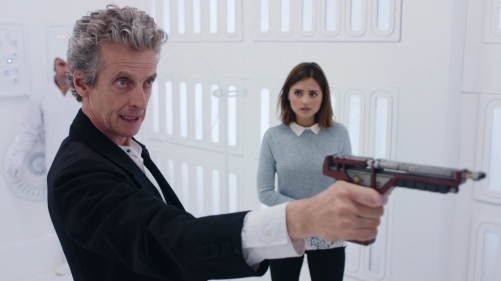
In “Hell Bent”, the Doctor returns to Gallifrey as a war hero. It’s the homecoming he’s desired since the end of Series 7 – however, it’s not under the circumstances he would like. While the Doctor has always felt nostalgic for the place where he grew up and the people he knew during the early years of his life (in fact, one of the first things he does is revisit the barn from “The Day Of The Doctor” and “Listen“, where he lived for a while before he joined the academy), he’s just been given a fresh reminder of how ruthless and corrupt the high council of Gallifrey can be, so his view of the place is very jaded right now. He helps the time lords to stage a mutiny against Rassilon, their tyrannical leader who brought their planet to ruin during the time war, and he promptly takes Rassilon’s place as the acting president of Gallifrey, questioning the other time lords about why they’re so interested in the Hybrid myth.
A long time ago, a prophecy was spun about a hybrid of two warrior races: a creature who would pose a threat to all of time and space in pursuit of its own agenda. Since Moffat loves a good bootstrap paradox, the time lords wound up creating their own problem. When they decided to backstab the Doctor, their actions set in motion a chain reaction of events that inadvertently got Clara killed as collateral damage – and unfortunately for them, the Hybrid turns out to be the Doctor and Clara’s codependent relationship. The Doctor is simply using the time lords to get into a position where he can save Clara with their technology, so he could not care less about sticking around to help them clean up their planet. He pulls her out of time and space, just a few seconds before the moment of her death, and despite being warned multiple times that his meddling could have disastrous consequences, he refuses to turn back, with the same stubbornness he displayed inside of his confession dial.
The Doctor generally tries to keep the worst parts of himself in check, so he can set a good example for others and try to live up to his mission in life. He doesn’t always succeed, but he does try. In “Hell Bent”, he stops trying to do that. He lets himself be selfish and irresponsible for once, so he can try to save Clara. He even renounces his name a few times – sometimes out of anger and sometimes out of guilt – since he’s not trying to live up to his title anymore. At one point, he pulls a gun on someone and shoots them so he can escape the capitol city with Clara. If you know anything about the Doctor’s personality, you know that is extremely out of character for him: it really drives home just how broken he is, and just how dangerous he’s becoming, now that he’s willing to break his own rules. After billions of years have passed since “Face The Raven”, Clara’s death is now a fixed point in time. It must happen, or else the space-time continuum will snap, but the Doctor refuses to accept that.
He snaps even further when he realizes his plan to bring her back to life isn’t working, because he’s come too far for it not to work. He put himself through four billion years of torture to reach this point, and if the time lords can’t revive Clara fully, then no one can. On some level, the Doctor knows that what he’s trying to do is a fool’s dream, and he feels extremely resentful about that. His god complex is unleashed as he rebels against the laws of time, something we know is beyond even a time lord. The last time we had an episode where the Doctor started to go mad with power was “The Waters Of Mars“, and I think that was territory that was worth exploring again a few seasons later. Because while the Doctor is a very heroic character, he also has a lot of qualities that would make him a scarily efficient villain if he ever decided to go down that path. The Master might be a notorious liar, but he’s always been honest about how they have quite a few traits in common.
Speaking of whom, back in Series 7, Missy decided to pair the Doctor and Clara up because they had a lot in common. She was hoping they would eventually bring out the worst in each other, and cause some beautiful chaos across the cosmos. After two and a half seasons of them becoming overly attached to each other, it would seem Missy’s scheme is finally ready to come to fruition. After having another talk with Ashildr, who sugarcoats nothing when it comes to calling him out on his selfishness, the Doctor tries to mindwipe Clara so he can hide her away on Earth, safe from the time lords. However, she refuses to give up her memories of the best years of her life and the loved they shared together, and like Ashildr, she calls him out on how far he’s fallen. Since Clara was the one he did all of this for, it’s fitting that she should be the one to finally talk him down.
Back in Series 7, Moffat stated that the Doctor doesn’t like endings: he always hates losing his friends. After seeing the insane lengths that he went through over the last three episodes, Twelve accepts that everything must end eventually – not only the life of the woman he loves, but his relationship with her as well. After sharing one last goodbye, the Doctor loses his memories of Clara, and he completely accepts his mindwipe as his penance for all of his selfish behavior. His grief will no longer haunt him to the point of madness, and he can at least take comfort in the knowledge that he was able to buy Clara some more time before she has to face the raven. This moment is meant to be tragic, but I know there were a lot of people who never forgave the Doctor for mindwiping Donna at the end of Series 4, who saw this outcome as his long overdue karma for that. By the end of “Hell Bent”, Twelve is now on his own for the first time in his tenure, since he’s always had Clara by his side. Now he must start anew and continue to make his way in the world without her.
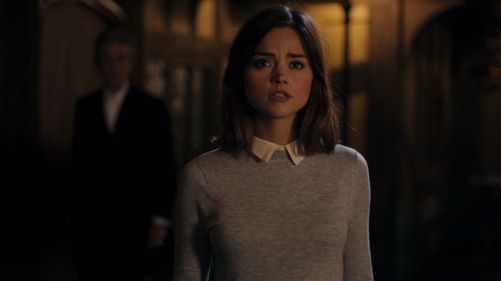
“Face The Raven” chronicles the final day of Clara Oswald’s (Jenna Coleman) mortal life, and the beginning of the end for her time with the Doctor. Like many other episodes this season, “Face The Raven” stresses the fact Clara is now a very experienced companion. She knows the TARDIS systems inside and out, she has razor sharp deductive reasoning skills, she always knows how to keep Rigsy calm when he starts to panic because she’s good with people, and she knows how to pump the citizens of Trap Street for info whenever she needs it. However, we also see the downsides of her time with the Doctor quite clearly. Nowadays, Clara is a shameless adrenaline junkie chasing after the high of death-defying adventures. She doesn’t really have a life outside of her adventures in the TARDIS anymore, and there’s nothing holding her back from being reckless, so she almost seems to have a death wish. She nearly falls out of the TARDIS to her death early on, while it’s flying over London, and she enjoys every moment of it – which is extremely disturbing.
Doctor Who has tackled the subject of codependent relationships before, with the Tenth Doctor and Rose Tyler in Series 2. Ten and Rose both got way too cocky and self-absorbed, and they laughed in the face of danger. Rose almost seemed to think they were invincible, and she never wanted to even entertain the idea of being separated from the Doctor, because she couldn’t live without him. Until the Series 2 finale, “Doomsday“, where everything came crashing down around them and they were given a harsh reality check. Like Rose, Clara winds up getting humbled by the events of her departure story. Except, whereas Rose got trapped in an alternate universe and had to deal with the pain of being separated from the man she loved, the price Clara pays for her hubris is much steeper.
The Doctor and Clara quickly discover that when the tattoo on Rigsy’s neck reaches the end of its countdown, he’ll be killed by a specter of death, taking the form of a raven. Clara feels plenty of sympathy for her terrified friend and his young daughter, who might lose her dad soon. Clara knows what it’s like to lose a parent, and she would never wish that on anyone. So she decides to take on Rigsy’s death sentence, in the hopes that she can outmaneuver Ashildr with her little gambit – and she does it behind the Doctor’s back, because she knows he wouldn’t approve of the risk she’s taking. Clara still erroneously believes that she and the Doctor can think their way out of any problem, so long as they’re clever enough and gutsy enough to find a solution. Like Rose, she’s gotten so good at doing what she does that she’s fallen into the trap of thinking she’s unbeatable.
However, Clara is tampering with things she doesn’t fully understand. She’s gotten very good at thinking the way the Doctor does, but she’s nowhere near as knowledgeable about alien technology as he is, nor is she as durable as him, so she makes a fatal error in judgement. Once she convinces Rigsy to pass along the Chronolock to her, she regrettably discovers that one, Rigsy was never in any real danger of being killed off, and two, now that she’s severed Ashildr’s connection to the raven, there’s no way to stop the countdown now. The most devastating thing about Clara’s death scene is how quickly it happens. The Doctor and Ashildr only discover what she’s done when she has mere minutes left on the clock. There’s barely any time for Clara and the Doctor to accept what’s happening, let alone share a meaningful, thoughtful goodbye. So Clara tries to make every word count, while the Doctor fiercely goes into denial that this is even happening in the first place.
As she admits some truths to herself, Clara also raises a disturbing possibility about why she might have ended up in this situation. Even after “Last Christmas” gave her some closure, she clearly never moved on fully from losing Danny. Perhaps the reason why she’s been pushing her luck so much is because on some level, some part of her actually wanted this – and it’s only just now that she realizes how much she wants to live, how much she’ll be losing shortly. Still, Clara owns up to the consequences of her actions (in contrast to the Doctor, who would much rather blame Ashildr, the time lords and even himself). She accepts her fate with as much courage and dignity as she can muster (the same kind of bravery she displayed when she dove into the Doctor’s time-stream in “The Name Of The Doctor“), and faces her death head-on.
Clara gives her friend what little comfort that she can, since she knows how badly he’ll be hurting soon, and she addresses her final wishes to him, to make sure he doesn’t hurt anyone in an attempt to avenge her after she’s gone. When the moment of truth finally comes, Clara’s death is cruel and excruciating and not what she deserves (or anyone, for that matter), as her soul is ripped from her body by the raven, but it’s where her story ends nonetheless. Even the events of “Hell Bent” leave it intact: in that episode, the Doctor simply manages to buy her some more time before her appointment with the Grim Reaper. Still, the fact that Clara died in an attempt to save Rigsy is significant. Rigsy was her wingman, her temporary companion, during “Flatline”: her first real experience of stepping into the Doctor’s shoes. Losing her life in an attempt to protect her friends (even if it was a pointless sacrifice) is exactly the sort of thing her mentor would do, and has done several times before.
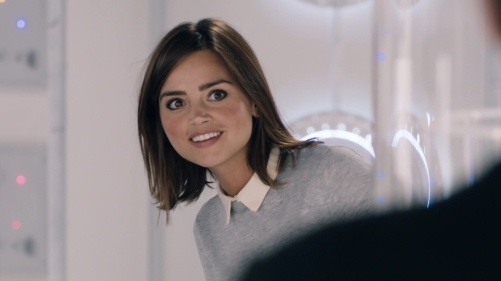
In “Hell Bent”, the Doctor manages to pluck her out of time and space, with her bodily functions frozen between one heartbeat and the next, and as a result, she’s neither living or dead now. Clara takes the Doctor’s word for it that he knows what he’s doing, only to slowly realize that he doesn’t actually have a plan this time. He’s just gone insane, he’s in really deep denial, and he does not care about the potential consequences of his actions. You really have to feel bad for Clara in “Hell Bent”. She discovers the man she loves has been tortured for an unfathomably long amount of time, and a lot of the pain he endured was self-inflicted as his own twisted form of atonement. His mind has snapped, and he’s well on his way to becoming a selfish monster who’s willing to put the entire universe in danger because of his obsession with her. That must be a horrific situation for her to find herself in.
Mind you, there’s also an element of “Be careful what you wish for” when it comes to Clara’s predicament in “Hell Bent”. Throughout her tenure as a companion, Clara has always encouraged the Doctor to throw caution to the wind and break his own rules more often for the greater good, or because she couldn’t handle losing someone (“The Time Of The Doctor“, “Dark Water“, “Before The Flood”, “The Girl Who Died”). In the Series 9 finale, she gets to see what a Doctor who’s not holding back at all anymore looks like, and it’s not a pretty sight. For her final regular appearance in the series, Jenna Coleman provides some excellent non-verbal acting in the concluding chapter of this trilogy: like the look of utter devastation that washes over Clara when she learns what the Doctor went through in his confession dial, or the silent horror that’s written all over her face when the Doctor starts barking at her in the TARDIS and she realizes just how unstable he’s become.
After she learns about the torment he endured during “Heaven Sent”, Clara decides to confess something to him among the Cloister bells – what she wasn’t able to say to him before at the Trap Street, because she didn’t have the time. We don’t get to hear it ourselves – the show pans away, to allow the pair their privacy – but we should be able to make some pretty good guesses. Doctor Who only gets vague like that when the L word is about to be dropped (“Doomsday”, “Let’s Kill Hitler“). Since the Doctor is not acting in everyone’s best interests for once, Clara can no longer trust his judgement like she’s always done. She tries to talk some sense into him several times, but her pleas fall on deaf ears, and eventually she has to put her foot down and stand up to him completely when he tries to wipe her memories in an attempt to keep her safe from the time lords.
The Doctor has already disregarded her wishes and made her death all about himself and his inability to move on. She refuses to let him rob her of the best years of her life as well – all the things that helped her grow as a person, that she lived and died for – because he won’t accept reality. Throughout this story, Clara is given a fair amount of agency about the way she’ll bow out from the series, and the choices that she makes always feel true to the character she’s been since day one. Clara has always been a stubborn, passionate, reckless, empathetic woman, who loves deeply and refuses to tolerate anyone disrespecting her. Whether you think their relationship is romantic or purely platonic, “Hell Bent” is clearly a break-up episode where the Doctor and Clara both admit that their relationship has grown too toxic for it to continue onwards – one of them needs to go, for their sake and everyone else’s. So they decide to play a game of Russian roulette with a device that will wipe one of their minds, and the Doctor loses.
The ending of “Hell Bent” is a very bittersweet one for Clara. The Doctor bought her some more time before she has to face the raven (on her own terms this time), and she gets to follow in his footsteps after all. But one has to wonder, was it all really worth it in the end? Because of her travels in the TARDIS, Clara can never go home again, she’s lost her friends and family, she’s lost Danny and the life she could have had with him, she’s even lost the Doctor and the love that they shared, and she’s going to be on the run from the time lords for the rest of her days. By the end of Series 9, Ashildr and her sweet new ride are really all that Clara has left.
Clara’s character has changed so much since we first we first met her in “The Bells Of Saint John“, and we’ve watched her grow every step of the way. In hindsight, I appreciate how her character arc is the complete antithesis of her predecessor, Amy Pond. Amy wanted to fly away into a world of fantasy and adventure, as an escape from her dull, dead-end life. Clara tried to make her travels with the Doctor a part-time thing at first, so she could stay grounded. Over time, Amy started to appreciate what an ordinary life on Earth with her lover could offer her, and she started to grow apart from the Doctor. Clara got swept up in the Doctor’s adventurous lifestyle completely, and she could never make her relationship with Danny work, even though they both cared a lot for each other. Amy ultimately left the TARDIS to settle down in one time and place with her husband Rory, while Clara reached the point where she could never be satisfied with an ordinary human life anymore. Her final fate in the series is to wander the universe with Ashildr in their TARDIS, until she decides she’s ready to rest. As such, the parallels between her and her mentor are now complete. Farewell, Clara Oswald. When it comes to the NuWho companions, you were one of the greats.
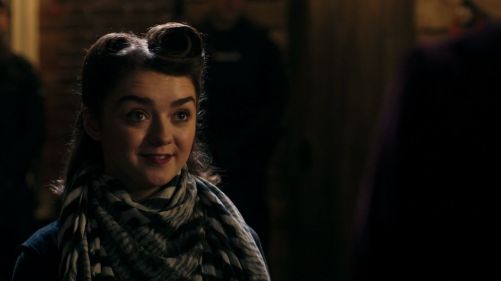
When we last saw Ashildr (Maisie Williams) in “The Woman Who Lived”, she was seeking a new purpose in life, something for her to strive towards after she resigned herself to her immortal existence. In “Face The Raven”, she has indeed found a way to make a difference in the world: she’s started a refugee camp for aliens stranded on Earth, seeking asylum. The idea of (relatively) peaceful aliens on Earth hiding away in their own little corner of the world builds upon the themes and ideas of “The Zygon Invasion” quite nicely. Instead of integrating into human society like the Zygons and constantly risking discovery, these people like to stick to their own kind. They’ll live their entire lives in seclusion, but they also get to live as themselves more easily. It’s always nice to see humanity’s relationship with other forms of life be portrayed in more complex shades of grey in this show, instead of humans simply being unambiguously good and aliens being unambiguously evil.
However, while Ashildr’s secret society seems like a good idea in theory, she is not a benevolent leader. She’s more along the lines of a cruel dictator who executes anyone who commits a crime in her community, however minor it might be, so she can make an example of them. Since she’s dealing with a wide variety of formidable alien races, she maintains peace and order in her domain under threat of death. With that in mind, you could certainly argue that the Trap Street residents have traded in one bad situation for a different one: since all they have to do to bring their lives to an end is get on Ashildr’s bad side one time. The lesson she supposedly learned in “The Woman Who Lived” about not losing sight of her compassion and humanity clearly didn’t stick after a few more centuries passed, and she’s now perfectly content to play the sanctimonious role of judge, jury and executioner over all those she resides over.
At some point prior to this episode, the time lords got in contact with her and threatened to destroy the Trap Street if she didn’t help them capture the Doctor. Ashildr doesn’t seem to be entirely comfortable with this arrangement, but she also doesn’t have too much of a problem with selling the Doctor out to his people, so long as no one gets hurt in the process – she knows that Twelve is a big boy who can take care of himself. However, she is legitimately horrified when her actions wind up getting Clara killed, since unlike the Doctor, she never bore any ill will towards her. Much like Clara, Ashildr is done in by her own hubris in the end. She convinced herself that she had everything well under her control, even though she was consorting with forces that were well beyond her with the Quantum Shade, and as it turns out, she did not plan for every variable. In her figurative game of chess, she only prepared for the moves the Doctor would make, and she didn’t take Clara into consideration.
In addition to feeling very remorseful about the consequences of her actions, things get pretty scary for her pretty quickly when the Doctor rounds on her. Ashildr is usually a very smug and haughty character, who knows she has the skills to back up all of her self-confidence. The ending of “Face The Raven” is notably the only time in Series 9 where she is legitimately afraid of the Doctor. She’s had plenty of time to hear the stories of how he’s dealt with people who have made themselves his enemies in the past – including the Family of Blood, who are still enjoying their eternity right now – so she’s well aware that nothing Twelve says to her while he’s still enraged about Clara is a lie or a bluff. The Doctor warns her to stay away from him for a long, long time after her betrayal, and she seems to be more than willing to oblige.
When we see her again in “Hell Bent”, she’s now trillions of years older and wiser – the last woman standing at the end of the universe, after all the other immortals have come and gone – and in a refreshing change from all of her previous appearances, she acts as a voice of reason in this episode. “Hell Bent” fully cements that Mire technology is incredibly overpowered, since that little chip that the Doctor implanted inside her has somehow kept her alive until the natural heat death of the universe, instead of simply breaking down over time from entropy like you would expect it to. Interestingly enough, even though Ashildr has forgotten many details about her life over the years (her home, her loves and even her own name), she still remembers Clara’s death clearly – she always made sure she would remember it clearly – which means it must have had a tremendous impact on her.
The Doctor and Ashildr swap places in this episode from where they were at in “The Woman Who Lived”. Now it’s Ashildr who imparts her own perspective of the world onto the Doctor, about the importance of accepting when things have come to an end instead of clinging onto the past, so she can talk him down from a path of madness. Unlike the Doctor, Clara has forgiven Ashildr for her part in her death, and after trillions of years of being forced to take the slow path, Ashildr finally gets her wish of being able to travel the universe in a TARDIS, when Clara brings her along with her for her final journey. My only real niggle is “The Woman Who Lived” raised a valid point that two immortals traveling together might not be a good idea, because of how their respective callousness might rub off on each other over time. So should we be concerned about what kind of influence Clara and Ashildr will have on each other after a while? Especially since Ashildr is already shady as hell.

Rigsy from “Flatline” returns in this finale, and he’s gained a happy life with his girlfriend and his newborn daughter since the last time we saw him. The events of “Face The Raven” are set in motion when Rigsy discovers a tattoo on the back of his neck, counting down to his doom. With the Doctor and Clara’s help, he discovers he’s been sentenced to death by Ashildr and her constituents after he was accused of murdering one of the Trap Street residents. Poor Rigsy spends a lot of “Face The Raven” questioning whether or not he’s actually capable of murdering someone, especially since he has a whole day’s worth of memories missing from his head. The Trap Street residents are all baying for his blood and are totally convinced of his guilt themselves, partly because it’s easier for them to blame and scrapegoat the outsider than face the possibility that one of them might have done the deed.
At the end of the day, Rigsy’s name is cleared. Predictably, Ashildr set him up, and as it turns out, he was never in any danger of being killed off in the first place. However, his exoneration comes at a price. How ironic is it that Clara once stopped him from throwing his life away in a totally unnecessary self-sacrifice, only for her to fall victim to that same fate herself a year later? Rigsy begged the Doctor and Clara for help with his problem, and reluctantly agreed to Clara’s crazy plan, even though he knew it was a bad idea from the start, because he trusted her judgement. So when Clara is killed, he naturally feels devastated and incredibly guilt-ridden. They didn’t know each other for very long, but she was his friend and she saved him several times over. The graffiti artist paints a memorial for her afterwards, to honor her memory, and since is the last time we’ll ever see him, there’s no telling how much Rigsy was haunted by the events of this episode for many days to come.
In “Hell Bent”, we’re reintroduced to both the high council of Gallifrey and the Sisterhood of Karn, two groups who have either been either allies or antagonists to the Doctor in previous episodes. Arguably, the most notable time lord of the bunch is the lord president, Rassilon. The last time we saw him in “The End Of Time“, the Master was trying his very best to kill him off with his new Sith Lord lightning as payback for using him. Apparently, the Master forced him to regenerate, and his latest incarnation is decidedly less impressive than Timothy Dalton’s. Rassilon is a very vain and power-hungry tyrant, who, underneath all his bluster, is terrified of losing his title to the Doctor. Because at this point in his exceptionally long life, his status and the fear he commands in the people who serve under him is really all that he has left.
Not long after the Doctor returns to Gallifrey, Rassilon tries to have him unlawfully executed so he can bump off the competition. But this decision promptly backfires, when it only winds up turning everyone against him. Rassilon led their civilization to ruin for centuries during the time war (and treated his subjects like trash along the way), while the Doctor saved them all from the fire: if the time lords had to choose which one of these men they would follow, then it really wouldn’t be a difficult decision for them. So Rassilon winds up going down like a chump, in what has to be the world’s easiest and most anti-climatic mutiny. Mind you, if the time lords thought they were trading him in for a better deal when they decided to help the Doctor commit treason, then they were sorely mistaken. Because the Doctor promptly reveals that he could not care less about helping them sort out their mess and instead swans off with Clara, with no intention of returning any time soon, leaving behind quite a power vacuum in his wake.
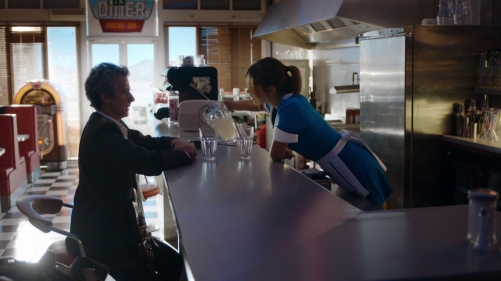
“Face The Raven” is directed by Justin Molotnikov, who previously worked on “Sleep No More“, while “Heaven Sent” and “Hell Bent” are directed by Rachel Talalaly, who previously helmed “Dark Water / Death In Heaven”. All three episodes show off the consistently high production values of Series 9, and all three of them have a strong cinematic flair to them. “Heaven Sent” is the third horror themed of this season, and it’s arguably the one that’s the most successful. The vast, grandiose and unnervingly empty castle setting gives this episode a totally different vibe than any other story we’ve seen from the Moffat era so far, and Rachel Talalay does an excellent job of making such a big location feel so claustrophobic at times. It’s also very unsettling watching the Veil creep up on the Doctor from the background of shots, long before the time lord notices its presence himself.
“Hell Bent” clearly takes a lot of influence from old spaghetti westerns of the 1960’s and 1970’s. The opening act of the episode sports some gorgeous visuals of the Doctor walking amongst the drylands on Gallifrey, strolling into his old hometown as a silent man with no name who rarely ever says a word, but makes every action of his count during his showdown with Rassilon. “Heaven Sent” was filmed in Cardiff Castle in Cardiff and Caerphilly Castle in South Wales, two places that have been previously been filming locations for “The Rebel Flesh“, “Nightmare In Silver“, “The Name Of The Doctor” and “Robot Of Sherwood“, while the desert scenes in “Hell Bent” was filmed in Fuerteventura in the Canary Islands, a region in Spain where the show has previously filmed episodes like “Kill The Moon” and “The Magician’s Apprentice”. The show’s visual effects are on top form this week, especially in “Hell Bent”, where we’re treated to several establishing shots of Gallifrey’s capitol city that are a real feast for the eyes.
Murray Gold’s score for “Face The Raven” is very somber and tragic, to the match the dour mood of the episode, with tracks like “Saving Rigsy“, “Madam Mayor“, “Running From The Raven“, and “Death Is Locked In“. The climatic piece, “Face The Raven“, is a seven minute long piece of music that’s actually used twice in this trilogy and gives Clara’s theme a beautifully tender reprise on a piano before she goes to face her fate. His music for “Hell Bent” is similarly moody in pieces like “Back Home“, “The General’s Regeneration“, “A Duty Of Care“. He brings back “The Doctor’s Theme” from Series 1 for a nice bit of musical continuity with the RTD era, and Clara’s theme becomes one of the few leitmotifs in the series to become diegetic (with the cue “Clara’s Diner“), when the Doctor plays it on his guitar as a way to remember her after she’s gone.
Murray’s lush, exquisite and downright operatic score for “Heaven Sent” actually takes up an entire disc on the Series 9 soundtrack, with tracks like “A Second Shadow“, “The Veil“, “A Fly On A Painting“, “A Change Of Clothes“, “A Mechanical Maze“, “Digging A Grave“, “Tell No Lies“, “Two Events In Life“, “Waiting For The Veil“, “The Final Room“, “One Confession Away“, “Break Free” and “Same Old Day“. Several story threads are given their own unique melodies, like the gloomy motif devoted to room twelve and the mystery surrounding the castle, the jaunty and bouncy air of the Doctor’s mind palace scenes, and the eerie scare chords that accompany the unpredictable nature of the Veil. The climatic piece, “The Shepherd’s Boy“, made its first appearance in “The Day Of The Doctor” and later became the Twelfth Doctor’s secondary theme. It’s a soulful and longing track built around a repeating melody that grows in strength with each loop completed, until it finally builds to a powerful climax as the Doctor manages to triumph over the Veil.
With “Face The Raven / Heaven Sent / Hell Bent”, you can really feel all the hard work and effort that the cast and crew members poured into this finale to make it something special, and their dedication paid off in the end, because the Series 9 finale is definitely one of the most iconic and thematically rich stories from the Steven Moffat and Peter Capaldi years of Doctor Who.
Rating: 10/10.
Side-Notes:
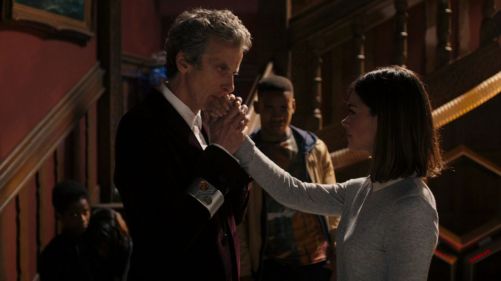
* For some reason, in “Face The Raven”, the usual theme song is wildly out of sync. The music does not line up with the graphics at all this week.
* In “Face The Raven”, we discover that the Twelfth Doctor does not approve of brand new parents going out and getting themselves tatted up: they might inspire their babies to do the same, after all.
* We get a nice nod to “Torchwood” this week. Rigsy was mindwiped with a Retcon pill, an amnesia drug that Captain Jack and his men always used to cover their tracks in that show.
* “My God, a whole London street just up and disappeared and you lot assume it’s a copyright infringement”.
* The Doctor tells some random kid on the street to ‘remember eighty-two’, and then it never comes up again. What exactly was the point of that?
* “I’m afraid no intruder leaves this place without a memory wipe. With respect, that will include you” “Oh, the hell it will” Sassy Clara.
* “Don’t worry, we’re perfectly safe” “Yes, a phrase I find is usually followed by a lot of screaming and running and bleeding”.
* “Do you think a Cyberman fears a merciful death? Peace on this street depends on one thing. To break it in any way is to face the raven” Stone cold.
* “Can I not be the good cop?” “Doctor, we’ve discussed this. Your face” Oof.
* “I can’t see everything, but she thinks she’s doing the right thing” “They usually do“.
* “I’m telling you, I don’t have it! Clara does!” And it was then that Ashildr knew, she fucked up.
* “The Doctor is no longer here! You are stuck with me. And I will end you, and everything you love!” Hot damn.
* “What’s the point of being a Doctor if I can’t cure you?” “Heal yourself”.
* “What about me?” “If there was something I could do about that, I would. I guess we’re both just going to have to be brave”.
* “This is as brave as I know how to be. I know it’s going to hurt you, but, please, be a little proud of me. Goodbye, Doctor” Oh wow, everything about this hurts.
* “She was saving you” “Oh, I was lost a long time ago. She was saving you” Oh snap.
* “As you come into this world, something else is also born. You begin your life, and it begins a journey towards you. It moves slowly, but it never stops. Wherever you go, whatever path you take, it will follow. Never faster, never slower, always coming. You will run. It will walk. You will rest. It will not. One day, you will linger in the same place too long. You will sit too still or sleep too deep, and when, too late, you rise to go, you will notice a second shadow next to yours. Your life will then be over“.
* “If you think because she is dead, I am weak, then you understand very little. If you were any part of killing her, and you’re not afraid, then you understand nothing at all. So, for your own sake, understand this. I’m the Doctor. I’m coming to find you, and I will never, ever stop!”
* “Clara said I shouldn’t take revenge. You should know, I don’t always listen” Edgy, Doctor, edgy.
* “Oh, what’s this? Well, are you gardeners? I hate gardening! What sort of a person has a power complex about flowers? It’s dictatorship for inadequates. Or to put it another way, it’s dictatorship”.
* “No, of course I had to jump! The first rule of being interrogated is that you are the only irreplaceable person in the torture chamber. The room is yours, so work it. If they’re going to threaten you with death, show them who’s boss. Die faster!”.
* “I’m going to explain to you how I survived. I can’t wait to hear what I say. I’m nothing without an audience”.
* “It’s a killer puzzle box designed to scare me to death, and I’m trapped inside it. Heh, it must be Christmas”.
* “Yes. Yes, of course you would. Which, let’s be honest, is what killed you” I almost feel bad for laughing at that.
* “It’s funny, the day you lose someone isn’t the worst. At least you’ve got something to do. It’s all the days they stay dead“.
* “Maybe I’m in hell? That’s okay. I’m not scared of hell. It’s just heaven for bad people” Heh, that was a callback to Sally Sparrow’s most emo line in “Blink“.
* “I can’t keep doing this. I can’t! I can’t always do this! It’s not fair! Clara, it’s just not fair! Why can’t I just lose?! I can remember, Clara. You don’t understand, I can remember it all, every time. And you’ll still be gone. Whatever I do, you still won’t be there” Ouch.
* “Doctor, you are not the only person who ever lost someone. It’s the story of everybody. Get over it, beat it, break free. Doctor, it’s time. Get up, off your arse, and win!”
* “All I have to find is some energy, and all you need for energy is something to burn!” I’ve said it before, and I’ll say it again. Peter Capaldi’s performance in this episode goes way harder than it has any right to.
* “There’s this emperor, and he asks the shepherd’s boy how many seconds in eternity. And the shepherd’s boy says, ‘There’s this mountain of pure diamond. It takes an hour to climb it and an hour to go around it, and every hundred years a little bird comes and sharpens its beak on the diamond mountain. And when the entire mountain is chiseled away, the first second of eternity will have passed.’ You may think that’s a hell of a long time. Personally, I think that’s a hell of a bird”.
* “Go to the city. Find somebody important. Tell them I’m back. Tell them, I know what they did, and I’m on my way. And if they ask you who I am, tell them I came the long way round”.
* “You can probably still hear me, so just between ourselves, you’ve got the prophecy wrong. The Hybrid is not half Dalek. Nothing is half Dalek, the Daleks would never allow that. The Hybrid destined to conquer Gallifrey and stand in its ruins is me” Twelve has never been more ready to raise some hell, man.
* “Is it a sad song?” “Nothing’s sad until it’s over, and then everything is”.
* “I heard the Doctor had come home. One so loves fireworks”.
* Is that soldier outside the barn seriously piloting that massive spaceship with a joystick?
* “Who the hell does he think he is?” “The man who won the time war, sir”.
* “The Doctor does not blame Gallifrey for the horrors of the time war. He just blames you” I completely approve of your sass, Ohila.
* “There was a saying, sir, in the time war. The first thing you’ll notice about the Doctor of War is he’s unarmed. For many, it’s also the last”.
* “Lord President, with respect, get off his planet” Betrayal.
* “This is no time to play the fool” “It’s the end of the universe. It’s the only time I’ve got”.
* “We’re on Gallifrey, Clara. Death is Time Lord for man flu!”
* “Exterminate me! Exterminate me!” Chilling, man.
* “You really are thick, aren’t you? The Doctor is back on Gallifrey. Took him four and half billion years to get here. What do you think he’s going to do now? Why, he’s stealing a TARDIS and running away. Bye!”
* “Since when is hope a bad thing?” “Hope is a terrible thing on the scaffold”.
* “The universe is over! It doesn’t have a say any more! We’re standing on the last ember, the last fragment of everything that ever was. As of this moment, I’m answerable to no one!” Your Time Lord Victorious is showing, Doctor.
* “How are you sustaining it?” “Brilliantly”.
* “Ashildr” “Me-” “Me, go to hell“.
* “Oh, but that’s easy. The Hybrid is you” I love the ‘bitch, please’ face that Ashildr makes after that accusation.
* “That doesn’t make sense” “It makes perfect sense and you know it” Ashildr is taking no prisoners today.
* “Let’s find out. Let’s do it like we’ve done everything else. Together”.
* “Run like hell, because you always need to. Laugh at everything, because it’s always funny. Never be cruel and never be cowardly. And if you ever are, always make amends. Never eat pears, they’re too squishy and they always make your chin wet. That one’s quite important, write it down”.
* As you might have noticed, Clara’s diner is the same one from “The Impossible Astronaut“. It’s a very poignant to see that the Doctor has aged so much more since the Matt Smith years that he’s starting to forget the adventures he had with the Ponds now.
* “Where are we going?” “Gallifrey. Like I said, Gallifrey. The long way round” Clara and Ashildr flying off together is expanded universe content just waiting to be written.
* “Run you clever boy, and be a Doctor” Clara’s catchphrase from Series 7 coming back one last time makes me so happy.
Further Reading:

- Gallifreyan Ramblings I, II, & III; The M0vie Blog I, II, & III; Tapetrade I, II & III; Junkyard Blog I, II, & III; Lyratek I, II, & III; Random Whoness I, II & III; Doctor Who Reviews I, II & III; Who In Review I, II & III.
